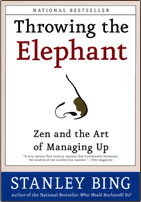…
“Elephants are terrific bullshit artists,
and are never doing quite as well
as you think they are.
This audacity makes them great,
if slightly smelly.
…
The elephant cannot be ignored.
It must be understood and directed this way and that.
It can be done, because for some strange reason,
in spite of all their size and power,
elephants need direction and know it.”
A funny, transcendently simple, ultra-enlightening and very Zen guide
that helps you to manipulate and control the large, grey behemoths that run the world,
otherwise known as your boss.
In Throwing the Elephant, Fortune magazine columnist Stanley Bing describes how to manage your boss. Simultaneously satirizing the self-help, self-discovery and business management genres, Bing stumbles upon more than a few truths that, although delivered tongue-in-cheek, merit serious consideration.
Bing says he learned a basic truth early: "You can't choose your boss."
Thus, your only choice is to mold the one you have into someone you can tolerate.
When you control your boss, you can "throw the elephant."
And just how do you achieve this nirvana?
Bing turns to Zen Buddhism, adapting its sacred principles to boss/employee interactions.
Bing identifies four truths that underlie professional life:
* Work is suffering. "The ability to boss other people around destroys much of human decency," writes Bing. "Evidence suggests that even Gandhi was a jerk to work for."
* Desire is at the root of suffering.
* Suffering can be conquered.
* There is a path to end suffering.
Your only hope: mastering "Zen and the Art of Managing Up." Sure, you can trust the elephants, Bing writes, but only as far as you can throw them. "This is the first time we come face-to-face with the need to actually throw the elephant."
So how do you get to that point? First, you discover how to handle the elephant, then how to manage it, then finally how to toss it. "That you are willing and able to do actual work gives you incredible power over a creature that by no means wishes to ... do any," writes Bing.
Another advantage you hold over elephants: They are large, you are not.
"Elephants are not afraid of big things, or are at least unwilling to admit such fear," Bing posits.
"Elephants are therefore left only the option of being afraid of little things that sneak up and surprise them. Such things include mice, loud noises, spreadsheets, ... unannounced visitors [and] word of the displeasure of a higher executive."
Equilibrium is essential to the elephant's survival, says Bing. You control small matters that can easily destabilize the elephant.
Bing concludes with a chapter titled "Finding the Elephant in You."
Adopting the tone of a self-help guru, he counsels readers on how to think of themselves in the boss/employee continuum: "Elephant? Or human? You can't be both.
The choice is in your hands. ... Think about it.
Or better yet sit down and don't think at all."

Mike Frost is a freelance writer based in Alexandria, Va.
















.jpg)




